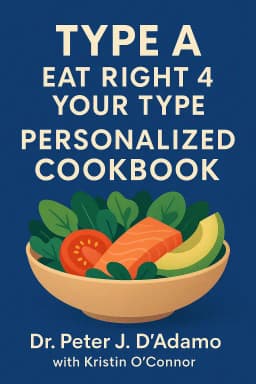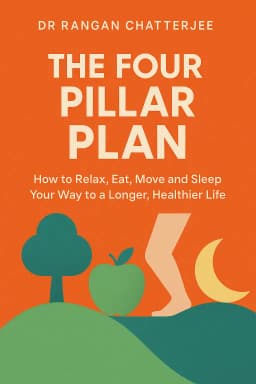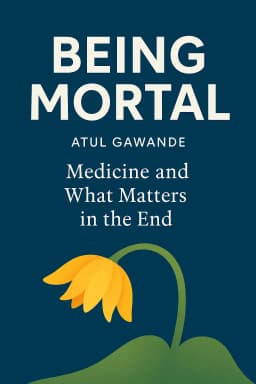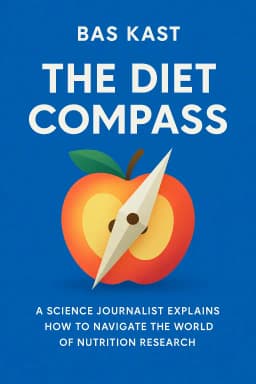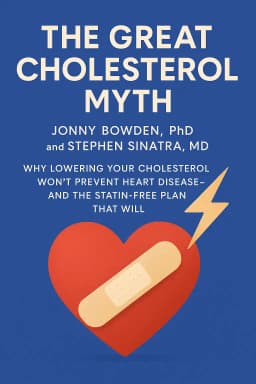
The Great Cholesterol Lie
Why Lowering Your Cholesterol Won’t Prevent Heart Disease—and the Statin-Free Plan That Will
Golden Hook & Introduction
SECTION
Laura: Here’s a wild thought. What if the single number your doctor has been most obsessed with for the last 40 years—your cholesterol—is actually a terrible predictor of a heart attack? And the drug billions are spent on might be causing more problems than it solves. Sophia: Wow, okay, that's a grenade to throw right at the start. That feels like questioning gravity. My entire life has been a chorus of 'watch your cholesterol, avoid the egg yolks, fear the butter.' Laura: Exactly. And that's the explosive premise of The Great Cholesterol Myth by Dr. Stephen Sinatra, a cardiologist, and Jonny Bowden, a nutritionist. Sophia: A cardiologist and a nutritionist teaming up to take down cholesterol? That’s an interesting duo. This book was incredibly controversial when it came out, right? I remember hearing about doctors protesting it when the authors went on TV. Laura: It was, and still is, polarizing. It sparked a huge debate because it directly challenged a multi-billion dollar industry and decades of public health messaging. And their argument starts by looking way back in time, at another widely accepted medical practice that we now see as completely barbaric. Sophia: Oh, I'm intrigued. Where are we going with this? Laura: We're going to 1799, to the deathbed of George Washington.
The Cholesterol Myth: Deconstructing a Medical Dogma
SECTION
Sophia: George Washington? What does the first U.S. President have to do with my cholesterol levels? Laura: Everything, according to the authors. Washington had a bad throat infection. His doctors, the best of their time, knew exactly what to do: bloodletting. They believed his "humors" were out of balance. So they drained him of almost two quarts of blood. Sophia: Two quarts! That's nearly half the blood in a person's body. Laura: It is. And it likely killed him. He died from the treatment, not the disease. The authors use this as a powerful metaphor. They argue that for centuries, brilliant doctors practiced harmful medicine based on a flawed theory, not because they were malicious, but because of groupthink. And they pose the question: is our modern obsession with lowering cholesterol with statins a form of modern-day bloodletting? Sophia: Whoa, hold on. That's a bold comparison. Are they really saying statins are the modern-day equivalent of draining someone's blood? Laura: In a metaphorical sense, yes. They argue it's a massive, well-intentioned intervention based on a deeply flawed premise. And they trace that premise back to one man: Ancel Keys and his famous "Seven Countries Study" in the 1950s. Sophia: I feel like I’ve heard of that. That’s the study that basically launched the entire low-fat movement, right? Laura: It is. Keys presented this beautiful, clean graph showing a direct line: the more saturated fat a country consumed, the higher its rate of heart disease. It looked incredibly convincing. The problem? He had data for twenty-two countries. He only published the data for the seven that fit his theory. Sophia: Wait, he cherry-picked his data? He left out the countries that didn't fit his hypothesis? Laura: He left out countries like France, where they eat tons of saturated fat but have low rates of heart disease. And countries like Chile, with low fat intake but high rates of heart disease. When other researchers plotted all twenty-two countries, the clean, straight line vanished. There was no correlation. Sophia: That is infuriating. So the entire low-fat craze, the decades of me eating bland, fat-free yogurt, was built on one flawed, selective study? How did that even happen? Laura: Politics. In the 1970s, the McGovern Committee was tasked with creating America's first dietary guidelines. They were heavily influenced by this anti-fat narrative and essentially turned this shaky science into official government policy. The food industry loved it. They could replace expensive fats like butter with cheap sugar and refined carbohydrates, slap a "low-fat, heart-healthy" label on the box, and sell it like crazy. Sophia: And that's how we got the "Snackwell Phenomenon." An entire generation thinking fat-free cookies were a health food, while we were actually just loading up on sugar. Laura: Precisely. We swapped fat for sugar, and in the process, the authors argue, we made ourselves sicker. The data backs this up. Studies like the massive Women's Health Initiative, which cost hundreds of millions of dollars, put tens of thousands of women on a low-fat diet for years. The result? It had no effect on heart disease. None. Sophia: So if cholesterol isn't the villain, and saturated fat isn't the enemy we thought it was... then what is actually causing heart disease?
The Real Culprits: The Arterial Wildfire
SECTION
Laura: This is where the authors introduce a much more compelling picture. They want us to stop thinking of our arteries as simple pipes that get clogged with gunk, like a kitchen drain. Sophia: Okay, that's the image everyone has. The cholesterol plaque just building up over time until it blocks the flow. Laura: Right. Instead, they say, think of your arteries as a forest. And cholesterol, specifically LDL, is just the trees in that forest. Having a lot of trees isn't inherently dangerous. A forest fire is the danger. Sophia: A forest fire. So what's lighting the match? Laura: The match is inflammation. The authors argue that heart disease is a disease of inflammation. Cholesterol only becomes a problem when it's damaged—or, to use the scientific term, "oxidized." Oxidized LDL is like a dry, brittle tree that's ready to catch fire. It becomes sticky, and it triggers an immune response in the artery wall. That immune response is inflammation. Sophia: So it's not the amount of cholesterol, but whether it's been damaged. And what's damaging it? What's the spark? Laura: The book points to a trifecta of modern culprits. The first and biggest is sugar. When you have high blood sugar, that sugar attaches to proteins and fats in a process called glycation. It essentially "caramelizes" them. Sophia: So the sugar in my morning muffin is basically 'rusting' my cholesterol particles? That's a terrifying image. Laura: It's a perfect way to think about it. That "rusted" or glycated LDL is what the immune system attacks, kicking off the inflammatory fire. The other sparks are oxidative damage from things like smoking or processed vegetable oils, and chronic stress, which floods your body with inflammatory hormones. Sophia: This makes so much more sense than the simple "clogged pipe" theory. It's a dynamic process, a fire, not a static blockage. So if total cholesterol is the wrong number to track, what's the one number we should be looking at? Laura: The authors are very clear on this. They say one of the best predictors of heart disease risk is your Triglyceride-to-HDL ratio. Triglycerides are the form of fat in your blood, and HDL is the "good" cholesterol that cleans up. When your triglycerides are high and your HDL is low, it's a huge red flag. Sophia: And what causes that bad ratio? Laura: A diet high in sugar and refined carbohydrates. It's all connected. A Harvard study found that people with the highest triglyceride-to-HDL ratio had sixteen times the risk of a heart attack compared to those with the lowest ratio. It's a far, far better predictor than LDL cholesterol ever was. Sophia: Sixteen times! That's staggering. It feels like we've been meticulously measuring the smoke while completely ignoring the fire. Laura: And that brings us to the most controversial part of the book: the so-called 'solution' that millions of people are prescribed to manage the smoke—statins.
The Statin Scam & The Astronaut's Story
SECTION
Sophia: Right, the blockbuster drugs. If they lower cholesterol, and damaged cholesterol is part of the problem, shouldn't they help? Laura: The authors argue that any minor benefit statins might have has almost nothing to do with lowering cholesterol. It's a side effect of their mild anti-inflammatory properties. But they come at a huge cost, because cholesterol isn't just some evil waxy substance. It's one of the most vital molecules in your body. Sophia: What do you mean, vital? I thought it was just... bad. Laura: Your brain is 25% cholesterol by weight. It's essential for creating cell membranes and for your neurons to communicate. It's the precursor to all your sex hormones, like testosterone and estrogen. It's crucial for synthesizing Vitamin D. When you aggressively lower it with a drug, you're disrupting all of these fundamental processes. And that can have devastating consequences. Sophia: Okay, you have to give me an example. Laura: The book tells the absolutely chilling story of Dr. Duane Graveline. He was a former NASA astronaut and a flight surgeon. A brilliant man. In 1999, his doctor put him on Lipitor, a popular statin, for moderately high cholesterol. Sophia: A standard procedure for a man his age. Laura: A few weeks later, he came home from his daily walk and his wife found him in the backyard, dazed. He had no memory of the past six hours. The doctors called it Transient Global Amnesia, or TGA. A rare event. He stopped the statin. A year later, a different doctor convinced him to try it again at a lower dose. Sophia: Oh no, I have a bad feeling about this. Laura: Two months later, the amnesia hit again. But this time it was catastrophic. He was walking with his wife in their neighborhood, and he suddenly stopped and asked her, "Where are we?" He didn't recognize his own home. He didn't recognize her. He had lost all memory of his life after graduating high school. Decades of his life—his career as a doctor, an astronaut, his marriage, his children—were just... gone. Sophia: That is absolutely horrifying. To have your own mind erased by a pill you're told is protecting you. Did the memories ever come back? Laura: Most of them did, slowly. But the experience transformed him. He dedicated the rest of his life to researching and writing about the dangers of statins, arguing that the war on cholesterol was a "scientific travesty." Sophia: But statins do show some benefit, right? The ads say they reduce heart attack risk by over 30 percent. That sounds significant. Laura: This is the final piece of the "myth" the authors deconstruct. It's a statistical sleight of hand. Let's use their lottery analogy. Imagine your chance of winning the lottery is one in 87 million. I sell you a magic wand that I guarantee will increase your chance of winning by 100%. Sophia: A 100% increase! That sounds amazing. I'd buy it. Laura: But what does that actually mean? It means your chance goes from one in 87 million to two in 87 million. The relative increase is 100%, which sounds incredible. The absolute increase is practically zero. Drug companies do the same thing. In one major Lipitor trial, the ads boasted a 36% reduction in heart attacks. Sophia: Sounds great. Laura: But the absolute numbers were this: in the placebo group, 3% of people had a heart attack. In the Lipitor group, 2% did. The absolute risk reduction was just 1%. You'd have to treat 100 people for years to prevent just one heart attack. The "36% reduction" is a relative number, and it's incredibly misleading.
Synthesis & Takeaways
SECTION
Sophia: So when you pull back the curtain, the whole story starts to unravel. The science was shaky from the start, the real culprits were ignored, and the "cure" is based on misleading statistics and carries terrifying risks. Laura: Ultimately, the book argues that we've been fighting the wrong war. We've been so focused on the passenger—cholesterol—that we've ignored the driver of the car, which is inflammation fueled by our modern diet and lifestyle. We're trying to lower the number of trees in the forest instead of putting out the fire. Sophia: So what's one simple thing someone listening can do today? I mean, obviously, they shouldn't just throw out their statins without talking to a doctor. Laura: Absolutely not. But the authors would say: look at your sugar intake. And not just candy and soda, but the hidden sugars in bread, pasta, cereals, and low-fat processed foods. They argue that reducing your consumption of sugar and industrial seed oils is the single most powerful step you can take to put out that internal, inflammatory fire. Sophia: It's a paradigm shift. It moves the power from the pharmacy back to your own kitchen. Laura: Exactly. It's about taking control of the things that actually fuel the disease, not just medicating a symptom. Sophia: This is such a huge topic, and we know it can be personal and even scary to question medical advice. We'd love to hear your thoughts and experiences. Join the conversation with the Aibrary community. Laura: This is Aibrary, signing off.
